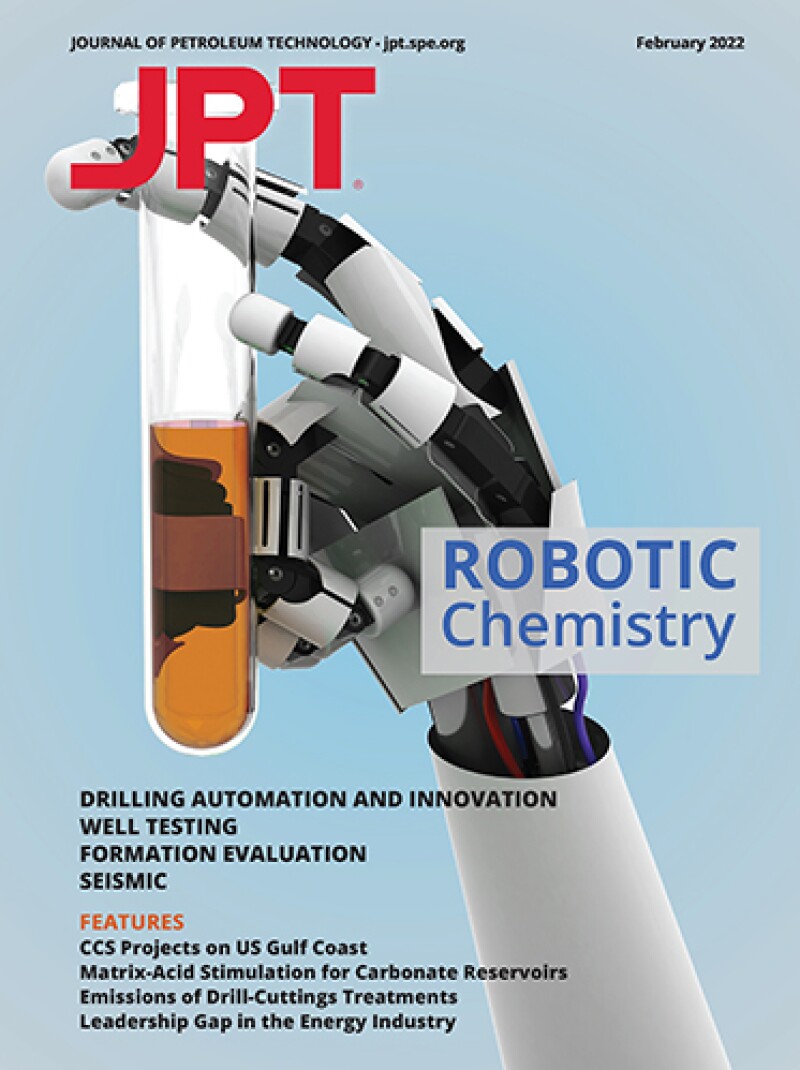JPT February 2022 Issue

On the Cover
Oilfield chemistry is turning to robotics to accelerate the development cycle of new chemicals meant to protect flowing assets from corrosion Source: Getty Images.
.
Read the JPT Digital Magazine [Members only]
Monthly Features
-
When water and metal meet, you get corrosion. You also get a good dose of creative engineering and innovation.
-
The Gulf of Mexico explorer is building off its offshore learnings to scoop up early carbon capture and sequestrations projects on the US Gulf Coast.
-
Business, management, and leadership skills, also known as soft skills or nontechnical skills, can and should be developed early in one’s career, preferably before receiving a promotion to a leadership position. These case studies illustrate the advantages of using business simulations and dedicated learning programs to practice both nontechnical and technical skills …
-
With the Omicron variant continuing to spread around the world, will a drop in oil prices follow? Maybe, but probably only in the short term.
Case Study
-
Carbonate reservoirs require effective acid stimulation to improve well productivity. For long horizontal wells, a complicating factor has previously been the difficulty of controlling acid placement along the reservoir section. The Smart Liner concept uses a number of small holes spaced in such a way so as to distribute the acid evenly along the reservoir interval.
Case Study
-
The study assessed the CO2 footprint and NO2 emissions for different drill-cuttings treatment alternatives. The values were then used to create an emissions calculator that can be applied to projects to clarify the actual potential for emissions reduction within the drilling-waste-management process.
President's Column
-
Regarding the long-term risks to our industry and a decreasing role of oil and gas in the energy transition in the future, I see an opportunity for companies to expand into new business segments and our members into new career opportunities.
Comments
-
Executives have become more concerned about climate over the past few months, according to a recent survey, but are in many cases picking the low-hanging fruit when it comes to demonstrating a real commitment to moving the needle. Their reasons may be valid.
E&P Notes
SPE News
-
SPE Sections and Student Chapters which are achieving exceptional longevity milestones this year.
People
-
Founder of the Flow Assurance Technical Section passed away 20 August 2021.
-
This section lists with regret SPE members who recently passed away.
Drilling Automation and Innovation
-
Changes in our industry have accelerated at a dramatic rate in an array of key technologies. Some of these initiatives have been under way for years and are familiar themes to SPE readers: artificial intelligence, automated decision making, data analytics, and visualization to name a few. Papers selected for this feature were chosen to highlight some of these areas of…
Well Testing
-
The subsurface is complex enough that multiple assumptions and hypotheses remain plausible; not all information may fit the storyline, and some might be dismissed or underweighted before the full range of possibilities is considered. A critical component of interpretation includes acknowledging one’s own bias and carefully listening to and seriously considering altern…
Formation Evaluation
-
The COVID-19 pandemic naturally has affected SPE meetings, causing many to be rescheduled or postponed indefinitely, but SPE papers continue to be a crucial source of technical knowledge. The selected papers explore simple and complex innovative approaches toward reservoir characterization to work around the absence of certain data.
Seismic
-
The past couple of years has been a rollercoaster for energy professionals, but it did not stop the incredible achievements in machine-learning (ML) techniques, particularly neural networks to improve seismic imaging.
SPE Members: Access the free technical papers synopsized above through 31 March.

























